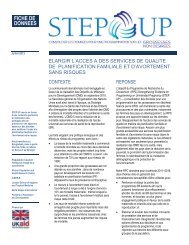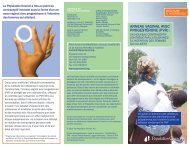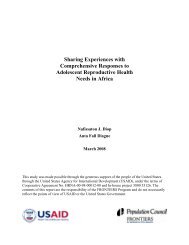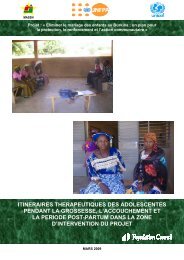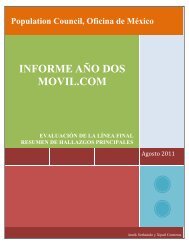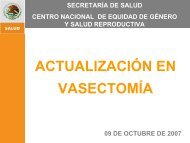Community Health Volunteer's Training Manual - Population Council
Community Health Volunteer's Training Manual - Population Council
Community Health Volunteer's Training Manual - Population Council
You also want an ePaper? Increase the reach of your titles
YUMPU automatically turns print PDFs into web optimized ePapers that Google loves.
Exercise 4.1.5<br />
Objective<br />
1. To discuss the need for items<br />
volunteers carry on home visits<br />
Questions<br />
1. What items should a volunteer carry<br />
along during home visits?<br />
2. Why is it necessary to carry along<br />
these items?<br />
Box 4.1.6<br />
Instructions to the Facilitator<br />
1. Lead a discussion on items<br />
volunteers carry along during<br />
home visits<br />
2. Discuss the need to carry these<br />
items<br />
3. Compare responses with<br />
those in Box 4.1.6 and update<br />
accordingly.<br />
Home Visiting<br />
Why carry items during home visits?<br />
You may meet a client/patient/case that needs immediate attention:<br />
1. ORS for a child with diarrhoea<br />
2. FP devices (Condoms, Pills) for a client/couple<br />
3. A needy client who has no access to health care<br />
4. Need to educate a mother or client about common disease problems using IEC materials<br />
5. Need to write down your observations, referrals made, defaulters traced and summary of<br />
facts.<br />
Topic 3 Role of the volunteer in home visiting<br />
Your role as a volunteer is to help families improve their own health. The volunteer identifies<br />
barriers that prevent families from adopting behaviours that will improve their health.<br />
Building on what they already know and have, the volunteer assists families to take the<br />
necessary actions to improve their own health.<br />
Note that the way you interact with people can help you work better than all your technical<br />
knowledge. When you are friendly and pleasant with your community members, they are<br />
more likely to take your advice.<br />
What your clients do about what you tell them depends on what they think and feel about<br />
you. So be respectful and patient, and treat your clients as special people.<br />
Exercise 4.1.6<br />
Objective<br />
1. To demonstrate the outcome of an<br />
unplanned home visit<br />
Time – 20 minutes.<br />
Instructions to the Facilitator<br />
1. Guide participants to role-play a<br />
poorly planned home visit<br />
2. Use the SHOWED approach to<br />
process the role-play.<br />
187






